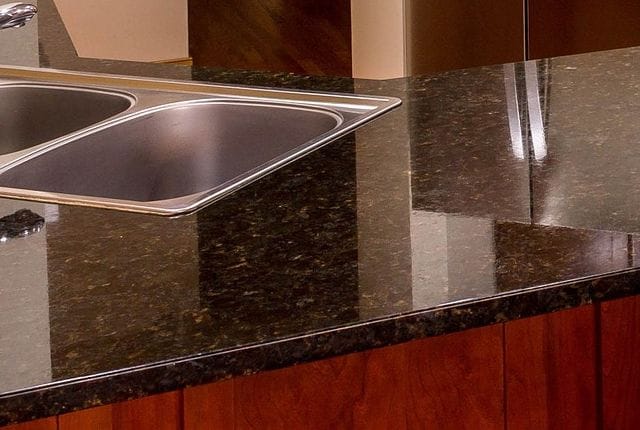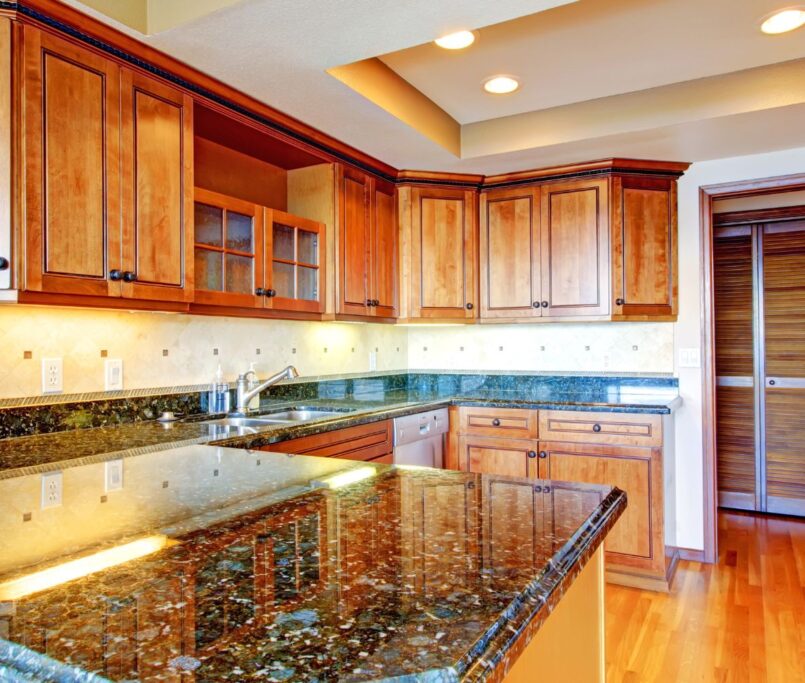How to Care and Maintain Stone Granite Countertops
How to Care and Maintain Stone Granite Countertops (Updated 2022)
How to Care and Maintain Stone Granite Countertops? One of the biggest fears people may have about natural stone is the maintenance it requires. With many individuals increasingly turning to the use of natural materials in their home, granite has become the countertop of choice. Synthetic solid surface materials are no match for the richness, depth, and incredible performance of real granite. (Click HERE to check Granite prices)
Unlike laminates and solid-surface materials, a hot pot or frying pan has no effect on granite’s mirror-like finish. Most importantly, by choosing a granite countertop you not only give your kitchen everlasting performance and beauty, but you also increase the value of your home.
Granite is also a very hard mineral and is virtually impervious to abrasions, impact damage and heat. However, the material is prone to cracking due to mechanical stresses caused by repeated heating and cooling. While the seams in between slabs provide some leeway for this repeated expansion and contraction, it is best to keep granite away from sources of large heat fluctuations.
You’ll find caring for your natural stone is easy. The best care you can give your natural stone is preventive care. By following a few suggestions, your countertops will last a lifetime while maintaining a brand-new appearance.
Basic Cleaning and Maintenance for Stone Granite Countertops Care
1. Avoid Using Cleaning Products With Any Kind of Acid or Abrasive
Avoid using harsh cleaning agents that contain strong acids/alkaline (e.g. bleach, glass cleaners, ammonia, degreasers) or abrasives (e.g. powdered ceramic/bathroom cleaners) as it can cause the sealant to discolor and scratch. Warm water, mild dishwashing liquid, and soft clean cloth are generally all that’s needed to maintain your granite countertop surface.
[Click Here to learn how to clean Granite Countertop]
2. Avoid Subjecting Your Stone Granite Countertops to Heavy Weights and Pressure
While hard, granite surfaces are brittle and you should not stand, kneel on, sit or stack heavy objects onto your countertops as they could crack or break. This doesn’t mean that granite is fragile, however, and it’s perfectly capable of supporting microwaves, dish holders, and other moderately heavy objects.
3. Do Not Place Hot Pans or Other Objects Directly on Your Stone Granite Countertops
Again, hot objects can cause the sealant to discolour (mainly in dark granites) and/or crack. Always use a protective barrier between any hot object and granite such as trivet or mat. Unsealed granite countertops do not have this problem, but are highly porous and come with other problems.
Always use a towel or a trivet to insulate your granite countertop from direct heatImage via Pexels
4. Wipe Off Spills as Quickly as Possible
Sealed granite countertops are surprisingly resilient to stains from citric acid, coffee tea, alcohol, or wine. However, as a preventive measure, wipe up any spills on the countertops within a reasonable amount of time and do not let the liquid sit on the countertop overnight.
[vc_btn title=”GET INSTANT QUOTE TODAY” color=”warning” size=”lg” align=”center” css_animation=”bounceIn” link=”url:https%3A%2F%2Fwww.stoneamperor.com.sg/instant-countertop-quote||target:%20_blank|” css=”.vc_custom_1526456146325{padding-top: 20px !important;}”]
5. Watch Out For Oil Stains
Granite is most prone to staining by oil – be careful not to place any pots or frying pans with oil traces at its bottom on the countertop surface. Blot oil and acid spills as soon as they happen, and clean with mild soap and warm water to avoid any harm to your countertops.
If the oil stains remain, there is a special cleaning procedure for the removal of deep-seated, time-set dirt and grime. A general poultice from baking soda and water is the best remedy. First, moisten the surface of the granite with the same liquid that made the paste.
Next, apply the poultice paste to the granite surface about half an inch thick. Tape plastic sheeting over the poultice area, and allow it to sit for 48 hours. Remove the poultice with a spatula, rinse the cleaned area with clean water, wipe off excess water, and allow the surface to dry.
6. Rinse Soap and Washing Detergents Off to Prevent Lime Build Up
Rinse with hot clean water on a regular basis and use a paper towel to dry. Another way to remove lime build-up, soap scum, stains or dried spills, is to use a straight razor blade in a gentle scraping motion.
Do not use lime removal products or cleaning products that contain ammonia, as this will affect the seal on the stone.
7. Avoid Hitting The Surface With Hard Objects.
Chips in granite are not a common occurrence. When they do happen, chips are most often caused by banging something into the edge of the countertop. Take care when you handle heavy pots and pans around your granite profiles as these are the most prone to cause chipping. If a chip does occur and you find the piece that chipped out, hold on to it. Most of the time it can be epoxied back into place.
Don’t even think about using a hammer on the surface. The impact will wreck your countertop.
8. Apply Sealers
The use of sealers is an excellent preventive measure and will encourage the preservation of your granite countertops. Some granite can be very porous. Sealers fill in natural pores and repel spills on the surface, radically reducing the rate of absorption. This gives you time to wipe spills away before they have a chance to penetrate your stone. After the installation process, the granite must be sealed.
We recommend a re-application of this sealer annually, or more often for some light granites, to fully maintain the luminosity and avoid stains. Some dark-colored, dense granites (browns, blacks) do not require sealing. When the water or liquid spilled on your countertop fails to bead up when splashed, or you begin to notice a water darkening spot that dries out, this is an indication that your countertop needs to be re-sealed.
9. Avoid Storing Chemicals on the Surface
It’s risky to store chemicals on the surface of your granite countertop in case of spillage. This includes cooking oil, hair products, chemical cleaners, and cosmetics.
Check out some Marble samples HERE
Check out some Granite samples HERE





